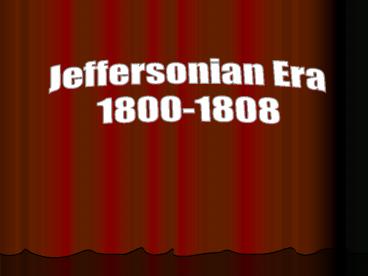Jeffersonian Era - PowerPoint PPT Presentation
1 / 17
Title:
Jeffersonian Era
Description:
ELECTION OF 1800 -Jefferson and Aaron Burr tie for President (vs. Adams/Pinckney) -both are Democratic-Republicans -Tie broken in Jefferson s favor Hamilton ... – PowerPoint PPT presentation
Number of Views:183
Avg rating:3.0/5.0
Title: Jeffersonian Era
1
Jeffersonian Era 1800-1808
2
ELECTION OF 1800
- -Jefferson and Aaron Burr tie for President (vs.
Adams/Pinckney) - -both are Democratic-Republicans
- -Tie broken in Jeffersons favor
- Hamilton convinces House to vote for Jefferson
- - Future problems avoided with 12th Amendment
- Added in 1804 to prevent ties
- Separate vote for Pres/VP
Thomas Jefferson and Aaron Burr
3
(No Transcript)
4
After losing to Jefferson in the election of
1800, Aaron Burr needed to revive his failing
political career. Shortly thereafter, Burr read
unflattering remarks made about him by Alexander
Hamilton, his longtime political enemy. Burr,
hoping for publicity, challenged Hamilton to a
duel. Usually, after a challenge was made,
differences were resolved peacefully. But
Hamilton and Burr did not reconcile. On the
morning of July 11, 1804, they threw dice to see
who would fire first. Hamilton won but fired
into the air. Burr then shot his opponent in the
stomach, and Hamilton died the next day. Burr was
charged with murder but fled before he was
brought to trial. In 1806, he became involved in
a failed plot to annex Mexico. Charged with
treason, Burr fled to Europe but later returned
to New York and practiced law until his death.
Hamilton v. Burr
5
ELECTION OF 1800
- -1st peaceable transfer of political power from
one party to another in modern government - -Federalists to Dem.-Republicans
- No violence in transfer of power
- -Jeffersons philosophy brought to the White
House and Democratic-Republican Congress - laissez-faire government
- Jefferson promises a small gov. with a hands-off
approach - Wants to reduce size of federal government
Every difference of opinion is not a difference
of principle,We are all Republicans, we are all
Federalists. Thomas Jeffersons 1st Inaugural
6
JUDICIAL REVIEW
- -Midnight Judges appointed
- Adams wants to leave behind Federalist judges
- Appoints judges right before leaving office
- -Jefferson refused to recognized judges
- Didnt force Madison to deliver appointment to
Marbury - -Marbury v. Madison
- Marbury sues Madison to get Court to enforce
appointment
John Adams William Marbury (Federalists)
Thomas Jefferson and James Madison (Democratic
Republicans)
7
JUDICIAL REVIEW
Chief Justice John Marshall
- -John Marshall is Chief Justice of Supreme Court
- Marshall ruled against Marbury, saying the Court
cannot make orders to Executive Branch - -case declares part of Judiciary Act
unconstitutional - -Establishes principle of Judicial Review
- Court can declare laws to be unconstitutional
- Power of courts to determine whether laws follow
Constitution
8
The Barbary Wars
9
Thomas Jefferson and his Agrarian Dream
10
WESTERN EXPANSION
- -Louisiana Purchase (1803)
- US wants mouth of Mississippi River for trade
- Jefferson bought Louisiana from France for 15
million - Jefferson debates deal strict constructionist
- Doubled the size of the U.S., as well as the
national debt
11
WESTERN EXPANSION
- - Lewis and Clark Expedition
- To explore the Louisiana Purchase
- Main purposes were to find a Northwest water
route to Pacific and to study resources on land - Sacajawea
- Native woman who helped Lewis and Clark by
serving as a tracker, translator, and guide
12
Significance of the Lewis and Clark Expedition
13
Thomas Jeffersons popularity during his first
term in office got him reelected by an
overwhelming majority in the Election of 1804.
14
WESTERN EXPANSION
- -Indian Conflicts
- Settlers moving West and pushing natives off
their land - - unfair treaties
- American settlers not upholding promises made
to natives- - Tecumsehs League
- Group of natives led by Tecumseh
- Ready to attack American settlers, aided by
British
White peoplehave driven us from the great salt
water, forced us over the mountains, and would
shortly push us into the lakes. But we are
determined to go no farther. The only way to stop
this evil is for all red men to unite.
Tecumseh
15
WESTERN EXPANSION
- - Battle of Tippecanoe (1811-Madisons Term)
- Tecumsehs men set up here
- William Henry Harrison
- Governor of Indiana who attacked Tecumsehs
League at Tippecanoe before they could attack him - Shatters Native American morale
In November 1811, while Tecumseh was absent, his
brother and aid led the Shawnee in an attack on
Harrison and his troops near Tippecanoe.
Harrison struck back and burned the Shawnee
capital to the ground. Harrisons victory, known
as the Battle of Tippecanoe, made him a national
hero.
16
FOREIGN AFFAIRS
- -US neutrality between Britain and France???
- Needed trade with both sides
- Jays Treaty expired
- War among European nations
- -British began impressment of sailors
- Making American sailors fight for the British
Navy - British attack U.S. ship
Impressment of American sailors into the Royal
British Navy
17
FOREIGN AFFAIRS
It has paralyzed industryOur fertile lands are
reduced to sterility. It will drive our seamen
into foreign employ, and our fisherman to foreign
sandbanksIt has dried up our revenue.
Philip Key, Congressmen
- -Jefferson gets Embargo Act passed to cut off
trade hurts U.S. business more than Europe - Angry about attacking American ships will not
trade with anyone - Ruins Jeffersons presidency
- Congress repealed in 1809
- -War Hawks emerge
- Want to begin war with British
- Henry Clay/John C. Calhoun
- Possibility of gaining lands
- Revenge for helping Indians
Mr. President, if you know what is good for your
future welfare you will take off the embargo that
is now such a check upon American commerce
New England merchant, 1808































